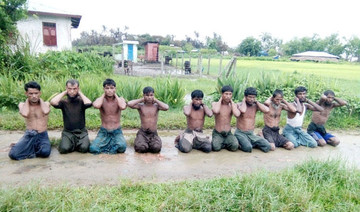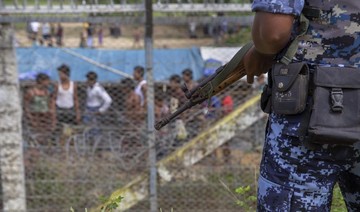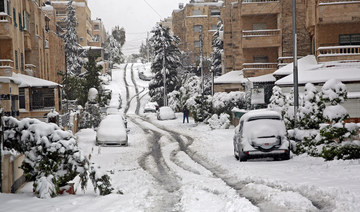COX’S BAZAR, Bangladesh: In hotels and restaurants near the beach at Cox’s Bazar in southeast Bangladesh, international and local aid workers sent to help the Rohingya in the world’s largest refugee settlement talk nervously of the major challenge ahead — the weather.
Cox’s Bazar was mainly known as Bangladesh’s top local tourism spot, famed for the world’s longest natural sea beach, until the 2017 arrival of more than 730,000 Rohingya fleeing persecution in Myanmar in a human exodus of unprecedented scale.
Joining thousands of Rohingya Muslims already in Cox’s Bazar, they cleared forests and built shelters from mud and bamboo to create a sprawling mass of camps that now house more than 900,000 people, of which 80 percent are women and children.
Over 18 months the Bangladesh government, with thousands of staff from about 145 non-government organizations (NGOs) and aid agencies, have brought order to the chaos, building more stable shelters, roads, sanitation and setting up community projects.
But while life in the settlement has started to stabilize, aid workers said they were rushing to secure the camps for the longer term with no sign of the crisis ending and one factor hanging over them — the monsoon in May then cyclone season.
“This is not an easy place to work because we are constantly worrying about things over which we have no control,” said Nayana Bose, spokeswoman for the Inter Sector Coordination Group (ISCG) that coordinates the humanitarian agencies’ work.
“It’s challenging in terms of terrain, weather, and population,” she said, adding this made it harder than other refugee crises and Bangladesh’s biggest ever humanitarian task.
Aid workers recalled how the early months of the crisis were focused on life-saving work, such as building shelters and latrines, food supplies, and dealing with health emergencies.
They worked around the clock in the camps located about 40 km (25 miles) south of Cox’s Bazar – a 1.5 hour drive that can take much longer depending on traffic on the pot-holed roads where aid agencies’ four-wheel drives vie with auto rickshaws.
Fly in, fly out
Most international staff came for three month stints but as time went on were replaced by staff on six month and one year contracts, working eight week shifts before flying out for one week of rest and recreation and to visit their families.
Leisure activities are limited in Cox’s Bazar, with alcohol in Muslim Bangladesh only available at some international hotels, so some aid staff set up yoga classes and book clubs.
Women must be dressed conservatively so swimming is not an option, although some aid workers value beach walks, and international workers are told not to leave hotels after 10 pm.
Firas Al-Khateeb, a spokesman for the UN’s refugee agency UNHCR, said he had worked with refugees in five other countries but the Rohingya crisis was more challenging.
First there was the sheer numbers involved, then language problems as most Rohingya are illiterate, complicating awareness campaigns about risks in the camps, and also the fact the Rohingya are not recognized by Myanmar and have nowhere to go.
Chances of the crisis ending soon are remote. Bangladesh’s government has vowed not to repatriate anyone unwillingly, garnering global praise for Prime Minister Sheikh Hasina who just won a third term despite reports of poll irregularities.
UN special rapporteur on human rights in Myanmar, Yanghee Lee, said on Jan. 25 it was clear the Rohingya cannot return “in the near future” with the situation unchanged and Myanmar still denying all accusations of persecution.
“The Rohingya are stateless and had been suffering back home. Some talk about the freedom they have here,” said Al-Khateeb, whose organization is frequently quoted saying the average length of stay in a refugee camp is around 15-20 years.
Getting ready
But he added that the weather was a major problem, with efforts now underway to make the camps as secure as possible in case of a severe monsoon or cyclone season. Last year the Cox’s Bazar area was not badly hit.
Anjum Nahed Chowdhury, a project manager with Christian Aid working on disaster risk reduction with BRAC, Bangladesh’s largest NGO, is focused on strengthening bamboo for shelters, digging ditches, landslide protection, and building brick roads.
“We must be ready for the monsoon season and we are much better prepared this year. If the cyclones had been bad last year it would have been a disaster,” she said.
While life in the camps is becoming normalized, the Rohingya are not allowed to formally work as this could impact local jobs, but they can earn about $5 a day on NGO projects in camps.
With this they can trade with each other at stalls that line the main roads winding through the camps that sell food, plastic toys and clothes as stray dogs and cows wander past.
Gemma Snowdon, a spokeswoman for the World Food Programme, said food in the camps was also changing to a longer-term plan.
At first they handed out rice, lentils and oil but now they are supplying people with cards with monthly amounts based on family size with which they can buy fresh food, dried fish and eggs from stores set up by local retailers in the camps.
Another program, run by the UN’s Food and Agricultural Organization (FAO), International Organization for Migrants (IOM) and WFP, is supplying all households with stoves and a monthly canister of LPG to reduce pollution and deforestation.
The loss of forest has been a key source of tension with some local people, who are now outnumbered two to one by the Rohingya, and lost some traditional income from the forest.
While other locals, like Theotonius Gomes who runs the Mag Darin restaurant, have welcomed the influx of aid workers which has boosted businesses and prompted the government to start work on an international airport terminal and extended runway.
But all the aid work comes at a cost.
Last year UN agencies and NGOs launched a $950.8 million appeal to provide essential humanitarian assistance, including to nearly 400,000 Bangladeshis in nearby communities, some of whom are as poor as the Rohingya, in a bid to diffuse tensions.
A new funding plan will be launched later this month, with initial drafts of the proposal, seen by the Thomson Reuters Foundation, showing the target will be about $920 million.
Aid groups are well aware raising funds could get harder as the crisis rolls on and new emergencies hit the headlines.
“But this emergency is not over yet. Still the Rohingyas need our help and support,” said Al-Khateeb.
Aid workers race to batten down Rohingya refugee camp with no sign of crisis ending
Aid workers race to batten down Rohingya refugee camp with no sign of crisis ending
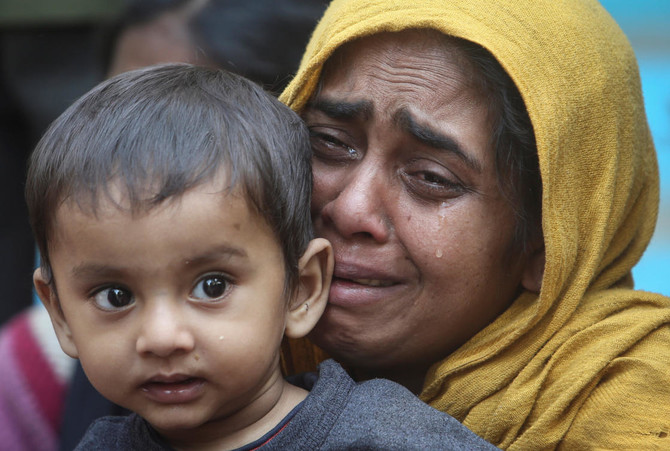
- Over 18 months the Bangladesh government, with thousands of staff from about 145 non-government organizations (NGOs) and aid agencies, have brought order to the chaos
- Aid workers recalled how the early months of the crisis were focused on life-saving work, such as building shelters and latrines, food supplies, and dealing with health emergencies
Germany failing to protect Muslims from hate: Human Rights Watch
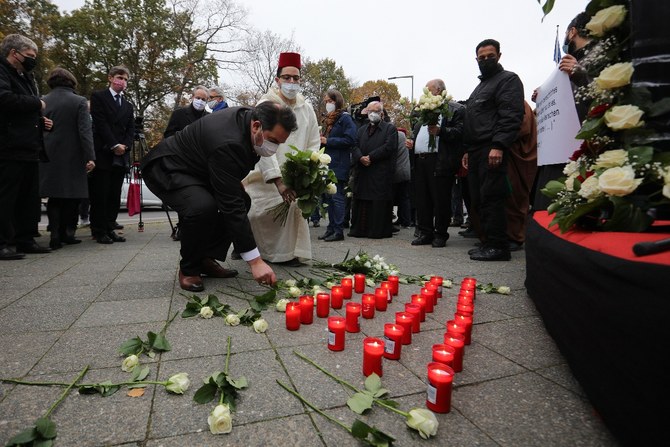
- Government ‘lacks understanding’ of racism targeting Muslim communities
- 2023 marked ‘frighteningly new high’ for hate incidents: German NGO chief
LONDON:Germany is failing to protect Muslims from growing racism amid a “lack of understanding” about the issue, Human Rights Watch has warned.
The country has yet to implement a working definition of anti-Muslim racism and frequently fails to record data on race-hate incidents, the organization said on Tuesday.
A key failing of the German government concerns its “lack of understanding that Muslims experience racism and not simply faith-based hostility,” said Almaz Teffera, a HRW researcher on racism in Europe.
“Without a clear understanding of anti-Muslim hate and discrimination in Germany, and strong data on incidents and community outreach, a response by the German authorities will be ineffective.”
Germany recorded 610 “anti-Islamic” crimes in 2022, but from the start of 2023 to September that year, the number had climbed to 686.
There are fears that the figure has further surged since the outbreak of the Gaza conflict last October.
Germany’s Interior Ministry told HRW that it could not provide data on anti-Muslim crimes from October 2023 to the year-end.
However, civil society groups in the country recorded a spike in reported incidents, leading Germany’s federal commissioner for anti-racism, Reem Alabali-Radovan, to join an EU-wide expression of concern about the rise in hate.
The Alliance Against Islamophobia and Anti-Muslim Hate, a German NGO network, documented “an average of three anti-Muslim incidents a day” last November.
The network’s chief, Rima Hanano, told HRW that “2023 marked a frighteningly new high for anti-Muslim incidents.”
Though the network collects its own internal data on the frequency of hate incidents, the German government “has yet to develop an infrastructure for countrywide monitoring and data collection,” HRW said.
The government has also classified hate incidents against Muslims as “anti-Islamic” since 2017, removing nuances surrounding the ethnic identities of victims, HRW added.
A three-year study commissioned by the government and published last year recommended that authorities “no longer dissociate anti-Muslim hate from racism,” but instead “recognize their connection.”
However, the Interior Ministry has failed to carry out the report’s recommendations, HRW said, adding: “Any focus on anti-Muslim hate and discrimination that fails to include racism or acknowledge the intersectional nature of such hostility will be unable to capture the full picture or inform effective policy responses.”
Muslim communities in Germany are a “group with a diversity of ethnicities” rather than a “monolithic religious group,” said Teffera.
“Germany should invest in protecting Muslims and all other minority communities in Germany because it is an investment in protecting all of German society.”
A gunman kills 6 worshippers inside a Shiite mosque in western Afghanistan, the Taliban say
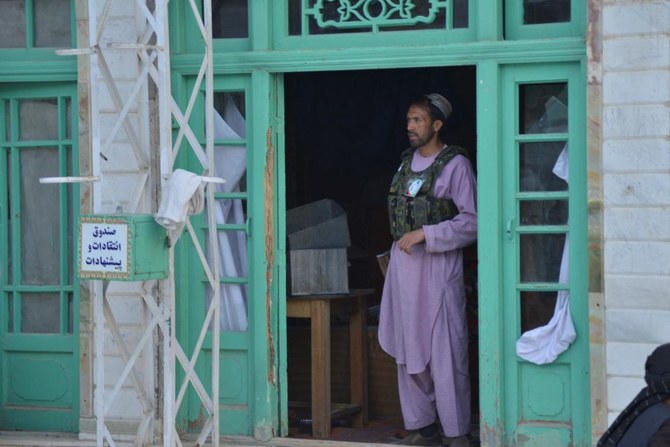
ISLAMABAD: A gunman stormed a mosque in western Afghanistan, opening fire and killing six people as they were praying, a Taliban official said Tuesday.
Local media reports and a former president of Afghanistan said the mosque was targeted because it was a place of worship for the country’s Shiite Muslim minority.
The attack happened on Monday night in the district of Guzara in Herat province, said Abdul Mateen Qani, a spokesman for the Taliban Interior Ministry. He said in a post on the social media platform X that an investigation was underway.
No one immediately claimed responsibility for the attack, which also wounded another worshipper while the attacker fled. Local media reported that the mosque's imam was among those killed.
“I strongly condemn the attack on the Imam Zaman Mosque,” former Afghan President Hamid Karzai said on X. “I consider this terrorist act against all religious and human standards.”
The United Nation Assistance Mission in Afghanistan also condemned the attack, which it said killed and wounded at least seven people, including a child. It called for urgent accountability for perpetrators and protection measures for Shitte communities.
The Islamic State group’s affiliate in Afghanistan is a major Taliban rival and frequently targets schools, hospitals, mosques and Shiite areas throughout the country.
The Taliban seized power in Afghanistan in August 2021, during the last weeks of the chaotic departure of U.S. and NATO troops from the country after 20 years of war.
Despite initial promises of a more moderate stance, the Taliban gradually reimposed a harsh interpretation of Islamic law, or Shariah, as they did during their previous rule of Afghanistan from 1996 to 2001.
Russia says United States is being hypocritical over ICC and Israel

- US President Joe Biden said last year that the ICC decision to issue an arrest warrant for Putin was justified
MOSCOW: Russia said on Tuesday that the United States was being hypocritical by opposing the International Criminal Court’s (ICC) investigation of Israel but supporting the court’s warrant for the arrest of President Vladimir Putin.
The ICC — which can charge individuals with war crimes, crimes against humanity and genocide — is investigating Hamas’ Oct. 7 cross-border attack and Israel’s devastating military assault on Hamas-ruled Gaza, now in its seventh month.
White House spokesperson Karine Jean-Pierre said on Monday the United States did not support the ICC’s investigation of Israel and did not believe that the court had jurisdiction.
US President Joe Biden said last year that the ICC decision to issue an arrest warrant for Putin was justified. The United States has shared details of alleged Russian war crimes in Ukraine with the ICC.
Russia says the warrant against Putin is a meaningless attempt by the West to soil Russia’s reputation and denies war crimes in Ukraine. Ukraine says Russia committed war crimes. Russia says the West has ignored Ukraine’s crimes, a charge denied by Kyiv.
“Washington fully supported, if not stimulated, the issuance of ICC warrants against the Russian leadership,” Russian Foreign Ministry spokesperson Maria Zakharova said in a post on Telegram.
But “the American political system does not recognize the legitimacy of this structure in relation to itself and its satellites,” Zakharova said, adding that such a position was intellectually “absurd.”
The Kremlin has called the issuing of the warrant against Putin outrageous and legally void, as Russia is not a signatory to the treaty that created the ICC.
Israel is not a member of the ICC, while the Palestinian territories were admitted as a member state in 2015.
Prime Minister Benjamin Netanyahu said on Friday that any ICC decisions would not affect Israel’s actions but would set a dangerous precedent.
Israeli officials are worried that the court could issue arrest warrants against Netanyahu and other top officials for alleged violations of international humanitarian law in Gaza, Israeli media have reported.
They said the ICC is also considering arrest warrants for leaders from Hamas.
London police arrest sword-wielding man after reports of stabbing

- Police said the suspect had attacked members of the public and two officers
LONDON: British police have arrested a man armed with a sword following reports of people having been stabbed during a serious incident in northeast London although it was not thought to be terrorism-related, the capital’s police force said on Tuesday.
The 36-year old man was arrested after police were called to reports of a vehicle being driven into a house in the area close to Hainault train station, the Metropolitan Police said in a statement.
Police said the suspect had attacked members of the public and two officers.
“This must have been a terrifying incident for those concerned. I know the wider community will be feeling shock and alarm,” Metropolitan Police Deputy Assistant Commissioner Ade Adelekan said. “We do not believe there is any ongoing threat to the wider community.”
The force said the incident did not appear to be terror-related and they were not looking for further suspects.
“I am being regularly updated about the incident at Hainault Station this morning,” Britain’s interior minister James Cleverly said on X. “My thoughts are with those who have been affected.”
Gunman kills six in attack on Afghan mosque – Taliban spokesman
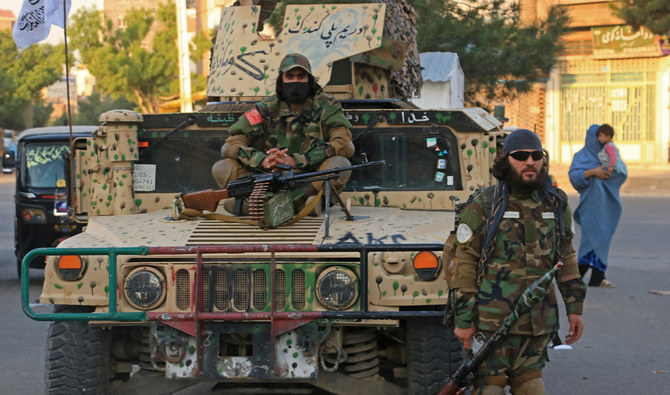
- Locals say the mosque served the minority Shiite community just south of the Afghan city of Herat
- While no group has claimed the attack, the regional chapter of Daesh is viewed as threat in Afghanistan
HERAT: A gunman stormed a mosque in western Afghanistan and killed six people, a government spokesman said Tuesday, with local residents claiming the minority Shiite community had been targeted.
Interior ministry spokesman Abdul Mateen Qani said that “an unknown armed person shot at civilian worshippers in a mosque” in Herat province’s Guzara district on Monday at around 9:00 p.m. (1630 GMT).
“Six civilians were martyred and one civilian was injured,” he wrote on social media platform X early Tuesday morning.
Locals said the mosque served the minority Shiite community in a district just south of the provincial capital of Herat city, and the imam and a three-year-old child were among those killed.
They also said a team of three gunmen staged the attack, contradicting the official account.
“One of them was outside and two of them came inside the mosque, shooting the worshippers,” said 60-year-old Ibrahim Akhlaqi, the brother of the slain imam. “It was in the middle of the prayers.”
“Whoever was in the mosque has either been martyred or wounded,” added 23-year-old Sayed Murtaza Hussaini.
While no group has claimed the attack, the regional chapter of Daesh is the largest security threat in Afghanistan and has frequently targeted Shiite communities.
The Taliban government has pledged to protect religious and ethnic minorities since returning to power in August 2021, but rights monitors say they’ve done little to make good on that promise.
The most notorious attack linked to Daesh since the Taliban takeover was in 2022, when at least 53 people — including 46 girls and young women — were slain in the suicide bombing of an education center.
Taliban officials blamed Daesh for the attack, which happened in a Shiite neighborhood of the capital Kabul.
Afghanistan’s new rulers claim to have ousted Daesh from the country and are highly sensitive to suggestions the group has found safe haven there since the withdrawal of foreign forces.
Taliban authorities have frequently given death tolls lower than other sources after bombings and gun attacks, or otherwise downplayed them, in an apparent attempt to minimize security threats.
A United Nations Security Council report released in January said there had been a decrease in Daesh attacks in Afghanistan because of “counter-terrorism efforts by the Taliban.”
But the report said Daesh still had “substantial” recruitment in the country and that the militant group had “the ability to project a threat into the region and beyond.”
Daesh chapter spanning Afghanistan, Pakistan and Central Asia claimed responsibility for the March attack on the Crocus City Hall concert venue in Moscow, killing more than 140 people.
It was the deadliest attack in Russia in two decades.


